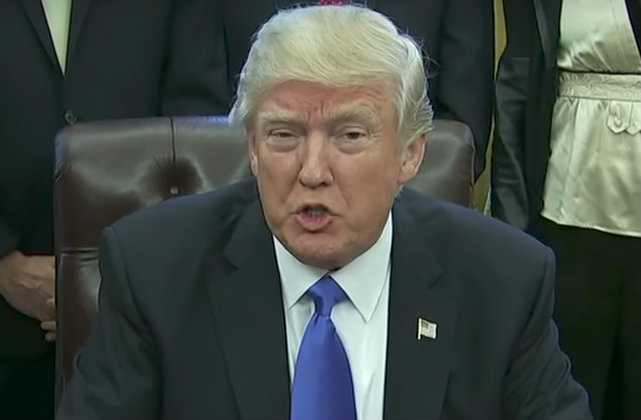 During former FBI Director James Comey’s testimony before Congress, he said that he is “sure” President Trump is being probed for obstruction of justice by newly appointed special counsel Robert Mueller. Many legal experts have weighed in on how hard an obstruction case would be against the President based on what we know so far. Those coming to Trump’s defense claim that his alleged comments to Comey about former National Security Adviser Michael Flynn don’t reach the standard required for an obstruction charge. Trump allegedly said in reference to the investigation of Flynn, “I hope you can see your way clear to letting this go, to letting Flynn go. He is a good guy. I hope you can let this go.”
During former FBI Director James Comey’s testimony before Congress, he said that he is “sure” President Trump is being probed for obstruction of justice by newly appointed special counsel Robert Mueller. Many legal experts have weighed in on how hard an obstruction case would be against the President based on what we know so far. Those coming to Trump’s defense claim that his alleged comments to Comey about former National Security Adviser Michael Flynn don’t reach the standard required for an obstruction charge. Trump allegedly said in reference to the investigation of Flynn, “I hope you can see your way clear to letting this go, to letting Flynn go. He is a good guy. I hope you can let this go.”
Trump’s backers believe that the expression of mere hopes is not the same as obstructing justice, but there are arguments showing that “I hope” could be enough. Law professor Dan Epps from Washington University in St. Louis put it plainly:
Lots of ways in which “I hope” can convey a threat. “Nice store you have here. I hope nobody burns it down.” https://t.co/quR65lm26y
— Dan Epps (@danepps) June 8, 2017
In response to that tweet, New York Times Supreme Court reporter Adam Liptak cited the case United States v. Collin McDonald, where the defendant was found to have obstructed justice based, in part, on a statement where he said to another person in a threatening letter:
I hope and pray to God you did not say anything about a weapon when you were in Iowa. Because it will make it worse on me and you even if they promised you not to prosecute you that’s not always true I would hate to see you go to jail…
A response to Liptak included another judicial opinion, this one from the Fifth Circuit Court of Appeals, where a person was found to have the “intent to an impede an investigation,” when they said to a witness, “I[‘m] just hoping you haven’t told anyone anything…. Like, ya know, talking or anything like that. Just don’t ah ya know?”
Epps gave one more ironic example of how “I hope” could be used in a threatening tone:
Here is a great example of “hope” being used to imply a threat. (Also confirms @isamuel’s theory that DT cursed to live out old tweets). https://t.co/su1LTJDWaO
— Dan Epps (@danepps) June 8, 2017
None of us were in the room when Trump allegedly expressed his hope about Flynn, so we don’t know the tone or manner in which it was said. But if it indeed was said in a threatening manner, that could be interpreted as at least an attempt to obstruct justice, which is basically the same as actual obstruction. 18 USC § 1503 says:
whoever . . . . corruptly or by threats or force, or by any threatening letter or communication, influences, obstructs, or impedes, or endeavors to influence, obstruct, or impede, the due administration of justice, shall be (guilty of an offense).
So simply endeavoring to influence the administration of justice is enough for an obstruction charge.
If there were indeed tapes that recorded the conversations between Trump and Comey, it would shed some light on whether the President had the intent to influence or obstruct a federal investigation. If Trump’s tone was innocent, it could exonerate him. If not, however, he better hope there are no tapes.
[Screengrab via CNN]
Have a tip we should know? [email protected]